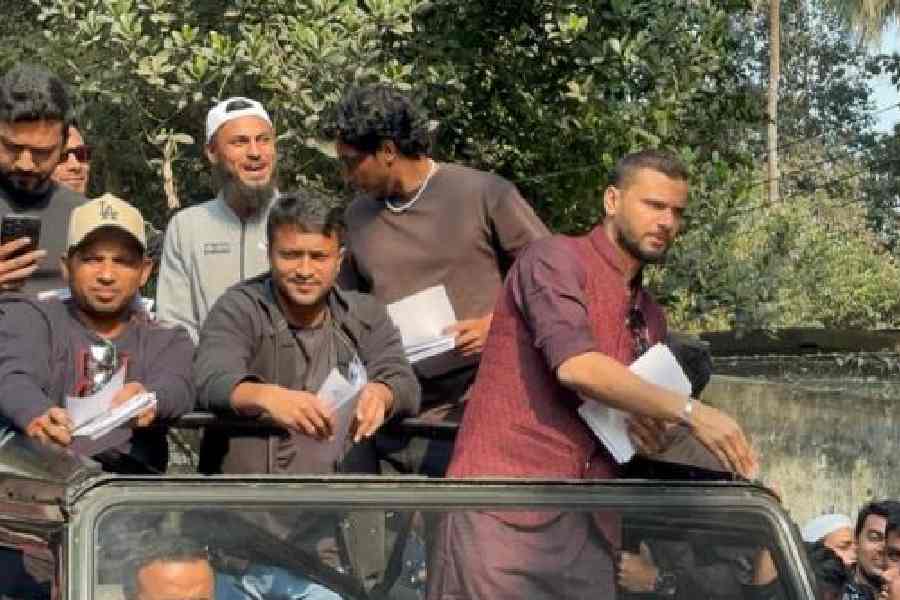One of the subcontinent’s most celebrated and colourful cricketers, he has led his country in all formats of the game, often winning matches through his own batting and bowling skills.
He has been among the handful of Bengalis to don the KKR colours with distinction, and has never shied away from controversy, on or off the field. He has had direct access to the Prime Minister and senior leaders of the ruling party, and there have long been rumours about him joining politics.
And he is fond of football.
Meet — er, no, not Sourav Ganguly but — Shakib-al-Hasan, Bangladesh cricket icon and one of the topmost all-rounders in the world in every form of cricket over the past decade and a half.
Unlike Sourav, whose tentativeness about joining politics has tended to mirror Indian batters’ fabled flirtatiousness outside off, Shakib has taken the plunge.
He is contesting Sunday’s general election in Bangladesh as a candidate for the ruling Awami League.
“If you want to make a difference to society in a big way, politics is the best vehicle,” Shakib told The Telegraph on Friday evening after a game of football with local lads from Magura-1 constituency, his launchpad as politician.
“I have been fortunate enough to play cricket for my country; now I want to give something back to the country. That’s why I have joined politics.”
Barring Prime Minister Sheikh Hasina, a candidate from Gopalganj-3, Shakib has been the cynosure in the poll season.
“Cricketing commitments did not allow me to get close to the people; politics has given me the chance to mix with ordinary people,” Shakib said.
Such a facility for “politician speak” may appear surprising, especially just weeks after he had, as Bangladesh captain in the World Cup, controversially got Sri Lanka’s Angelo Mathews “timed out” — the first such dismissal in the 146-year history of the international game. Khalid Jamil, sports journalist with the popular news channel Ekattor Television, told this correspondent that in his political avatar, Shakib has been markedly different from the aggressive, defiant cricketer the world has known.
“He is very shy and hardly wants to make speeches,” Khalid said, before adding that Shakib has had a gruelling campaign roster over the past 16 days.
Shakib has, however, received staunch support from his fellow Bangladesh cricketers Saumya Sarkar, Sabbir Rahman, Abu Haider Ronny and Ronny Talukdar.
Perhaps the most valuable backing came from Mashrafe Bin Mortaza, also a former Bangladesh captain, who rode an open jeep with Shakib in Magura, a dusty town in southern Bangladesh where one of the people’s biggest grouses is the condition of the roads.
“Shakib is new in politics compared to Mashrafe. He (Mashrafe) went to Magura to stand by his former teammate and urge people to elect him,” Khalid said.
Mashrafe, who began his political career as an MP from neighbouring Narail five years ago, has matured as a politician and boasts a grass-root connection, he added.
The two cricketers have perhaps become the ruling party’s biggest assets as it battles the narrative that ordinary Bangladeshis are uninterested in the election, boycotted by the main Opposition BNP and its allies.
Do the pictures showing thousands crowding around Mashrafe and Shakib suggest a lack of popular interest in the polls, the Awami League’s spin doctors have been asking.
“Please come out and vote for the future of Bangladesh,” has been Mashrafe’s refrain at all his campaign meetings, complementing Hasina’s appeal to people to come out to vote and prove that “democracy prevails” in Bangladesh.
With the campaigning done and dusted by the 8am deadline on Friday, Shakib was in a relaxed mood. “You feel nice and relaxed after a game of soccer,” he told this newspaper.
He sounded like a seasoned politician as he added: “The young generation don’t have much interest in politics — this is a global trend. But I think they should have an interest in politics as it concerns the future of our societies.... I think that if people like us come forward, younger people will have more interest in matters related to politics.”
Shakib’s candidature from Magura has raised local expectations about the region’s development prospects.
Mashrafe and Shakib have around five opponents each, from groups such as the Jatiya Party and smaller outfits, with media reports predicting landslide victories for both.
Given their popularity, the voter turnout is expected to be high in these two primarily semi-urban constituencies. This should be good news for the Awami League, which is believed to be eyeing a countrywide voter turnout of 40 to 50 per cent.
Like Shakib, the ruling party has fielded another candidate popular on both sides of the border: film actor Ferdous Ahmed.
Ferdous’s campaign outings, where he has been seen with fellow actors like Apu Biswas, have often added to the traffic snarls in Dhaka with crowds gathering for a glimpse or a selfie.
“I have been in the film industry for over two decades and have received the love of the people, but this experience is completely different,” Ferdous, a candidate from Dhaka-10 where Hasina is a registered voter, told this correspondent while leaving the party office in the Tejgaon area.
Although urban areas like Dhaka tend to witness poor voter turnouts, Awami League insiders hope that Ferdous’s appeal would lead to a decent footfall at the booths.
In their quest for a sizeable turnout, Awami League strategists are also banking on other popular figures such as musician Dolly Sayantani — Bangladesh Nationalist Movement candidate from Pabna-2 — and film actress Sharmin Akter Nipa (popularly known as Mahiya Mahi), contesting as an Independent from Rajshahi-1 against ruling party heavyweight Omar Farooq Chowdhury.
Mahi, among the highest-paid actresses in Bangladesh, who was denied nomination by the Awami League, has created a stir by accusing some opponents of harassing her.
“It’s going to be a tough contest, but the election will be held like a festival in my constituency,” she told local reporters before the campaigning ended.











